Table of Contents
Enjoy:
- Over 60 AI tools to create quality content
- More time for creativity, stress-free
- Impactful content that attracts readers and visitors
All with just one click.
Blogging is an activity that allows us to explore a fundamental element: SEO keywords, but especially nowadays, it’s crucial to understand the effectiveness and power of long tail keywords or also known as long-tail keywords These text fragments are much more than simple terms; they represent the beating heart of every successful SEO strategy. They are the essence that can make the difference between a blog that gets lost in the vast sea of the web and one that emerges as a reference point. Are you ready to discover how to choose SEO keywords and make your blog a beacon of knowledge? Get ready, because the journey is about to begin.
The Foundation – What is a Keyword in Blogging and How to Find Keywords for SEO
SEO keywords are the terms or phrases that users enter into search engines when looking for information on a specific topic. These keywords play a crucial role in the ranking of your blog in search results. When they are used and incorporated into blog content, the blog itself has a better chance of being found by users searching for that particular topic.
However, it’s essential to remember what keywords are and how not to overuse or force them. They should flow naturally and coherently within the text. So, as you strive to incorporate these keywords into your content, ensure that the flow of writing maintains its quality and readability.
In addition to using keywords within content, it’s also vital to integrate them into other vital areas of the blog, such as meta tags, image descriptions, and page URLs This helps search engines better understand your blog’s content and position it appropriately in search results.
Another essential practice to keep in mind is conducting keyword research to integrate into your SEO strategy. Using keyword research tools like Ubersuggest or SEMrush, you can identify which terms or phrases are most searched by users and then tailor your content accordingly. This will help you effectively position your blog and attract a broader audience.
In conclusion, keywords are a crucial element in the world of blogging. When used correctly and strategically, they can make the difference between a successful blog and one that goes unnoticed. So, take the time to understand the importance of keywords and strive to integrate them into your content strategy. In doing so, you will transform your blog into a beacon of knowledge and attract the attention of a broad audience.
There are various tools that can facilitate keyword research for SEO, and we’ll mention some of them:
The Art of Discovery – Why are Keywords So Important?
Understanding how to find SEO keywords and what people are searching for is a treasure that you should never underestimate.
Imagine the online world as a dark labyrinth without maps or guiding lights. In such a scenario, searching for information would be like wandering aimlessly, not knowing the right path to take. Keywords act as guiding lights in the labyrinth, illuminating the way and helping you reach your goal without getting lost in the shadows.
It is clear how essential it is to organize the digital world to prevent disorder and confusion. This concept extends to the online world as well. Whether you’re looking for a delicious recipe, an effective weight loss method, or the secret to happiness, it all begins with a question formulated in your mind, expressed through words. Words are the means through which our thoughts take shape. They play a key role in every online search and interaction.
To obtain quick and relevant answers from search engines, we must employ keywords, specific terms that connect us directly to what we are searching for. Think of keywords as special keys that open the doors to the vast treasure trove of information available online. Choosing the right keywords is crucial to obtaining relevant and timely results during our online navigation.
The Foundation – What is a Keyword in Blogging
Keywords are the terms or phrases that users type into search engines when seeking information on a particular topic. These keywords play a fundamental role in the positioning of your blog in search results. When they are used and incorporated into blog content, the blog itself has a better chance of being found by users searching for that particular topic.
However, it’s important to remember that keywords should not be overused or forced but used consistently and naturally within the text. So, as you strive to incorporate these keywords into your content, ensure that the flow of writing maintains its quality and readability.
In addition to using keywords within the content, it’s also essential to integrate them into other important areas of the blog, such as meta tags, image descriptions, and page URLs. This helps search engines better understand your blog’s content and position it appropriately in search results.
Another important practice to keep in mind is conducting thorough keyword research relevant to your topic. By using keyword research tools, you can identify which terms or phrases are most sought after by users and then adjust your content accordingly. This will help you effectively position your blog and attract a broader audience.
In conclusion, keywords are a crucial element in the world of blogging. When used correctly and strategically, they can make the difference between a successful blog and one that goes unnoticed. So, take the time to understand the importance of keywords and strive to integrate them into your content strategy. In doing so, you will transform your blog into a beacon of knowledge and attract the attention of a broad audience.
There are various tools that can facilitate keyword research, and we’ll mention some of them:
The Art of Discovery – Why are Keywords So Important?
Understanding what people are searching for is a treasure that you should never underestimate.
Imagine the online world as a dark labyrinth without maps or guiding lights. In such a scenario, searching for information would be like wandering aimlessly, not knowing the right path to take. Keywords act as guiding lights in the labyrinth, illuminating the way and helping you reach your goal without getting lost in the shadows.
It’s evident how crucial it is to bring order to our surroundings to prevent chaos and confusion. This principle applies to the online world. Whether you’re searching for a delicious recipe, an effective weight loss method, or the key to happiness, it all starts with formulating a query in your mind, expressed through words. Everything begins with words; they are the vehicle through which our abstract thoughts take shape in the mind. Words play a fundamental role in every process of online search and communication.
To obtain quick, coherent, and effective answers from online searches, we must use keywords, which are key terms that provide direct access to what we need. Think of keywords as magical keys that unlock access to the treasure trove of information that the online world has to offer. Carefully choosing keywords is the key to achieving relevant and immediate results in our online exploration.
6 Essential Reasons to Integrate Keywords into Your Blog
1. Increase Search Engine Visibility: Keywords are essential for search engines to understand the content of a web page. By integrating relevant keywords, you have a higher chance of ranking your blog high in search results. This leads to a greater likelihood that those searching for information related to your SEO keywords will find your blog.
2. Attract a Targeted Audience: Keywords help you reach a specific audience. Those searching through specific keywords are likely interested in related content.
3. Improve Traffic Quality: It’s not just about having traffic; it’s about having the right traffic. Well-chosen keywords filter the audience, attracting visitors genuinely interested in your content.
4. Make Content More Relevant: Proper keyword use makes your content more relevant to readers, enhancing their experience and encouraging future returns to your blog.
5. Compete Effectively Online: In a vast and competitive online landscape, keywords allow you to compete effectively, especially if you can identify less competitive but highly relevant long-tail keywords.
6. Monitor and Optimize: With analytics tools, you can monitor the performance of your SEO keywords, measuring the effectiveness of your strategy and making optimizations to improve your blog’s ranking and effectiveness.
In summary, keyword integration is essential for SEO, enhancing visibility, attracting the right audience, and optimizing content for search engines, ultimately leading to the success of your blog.
The Art of Keyword Blogging in Copywriting
We’ve discussed the importance of keywords in your blog. Now, let’s see how to skillfully integrate keywords into blogging without compromising the quality of the text. This is an art that aims to satisfy both search engines and readers.
“Here are some tips on how to effectively integrate SEO keywords into your blog:”
Engaging Title with Keywords: The title is the first impression of your content. It should contain your main keyword and be appealing to readers.
“SEO-Friendly URL: The URL should reflect the content. Include your main keyword clearly in the URL.
Effective H1 Tag: The H1 tag grabs attention. “Include your main keyword here, slightly varying from the title to cover different queries.”
Compelling Meta Description: A meta description with your keyword can influence the click-through rate from search results.
Structure with Headers: Use headers (H2, H3, etc.) to organize the content and define topics, helping both readers and search engines.
Internal Table of Contents: Create an index with internal links to the sections of the article. If you use WordPress, consider plugins like ‘Table Of Content Plus’ or ‘Rank Math SEO’ to create an internal menu.
By following these tips, your SEO keywords will become an integral part of your blog, improving visibility and the reader’s experience.
The Power of Long Tail Keywords in Blogging
Long tail keywords are essential for SEO. They are specific phrases composed of three or more terms, more detailed than generic keywords. Here’s what you need to know about long tail keywords:
To find long tail keywords, use Google’s autocomplete feature. These keywords are related to natural language and complete questions that users ask search engines. Long tail keywords offer benefits such as lower competition and greater relevance to user intent.

Voice searches and ‘conversational search’ are on the rise. Long tail keywords are suitable for this trend, resembling natural language and questions asked in voice or conversational searches.
Statistics on Long Tail Keywords
Backlinko – What is a long tail keyword?
- Long tail keywords are search terms with relatively low search volume and competition levels. Typically, they tend to be longer in length (3+ words) compared to most other types of keywords.
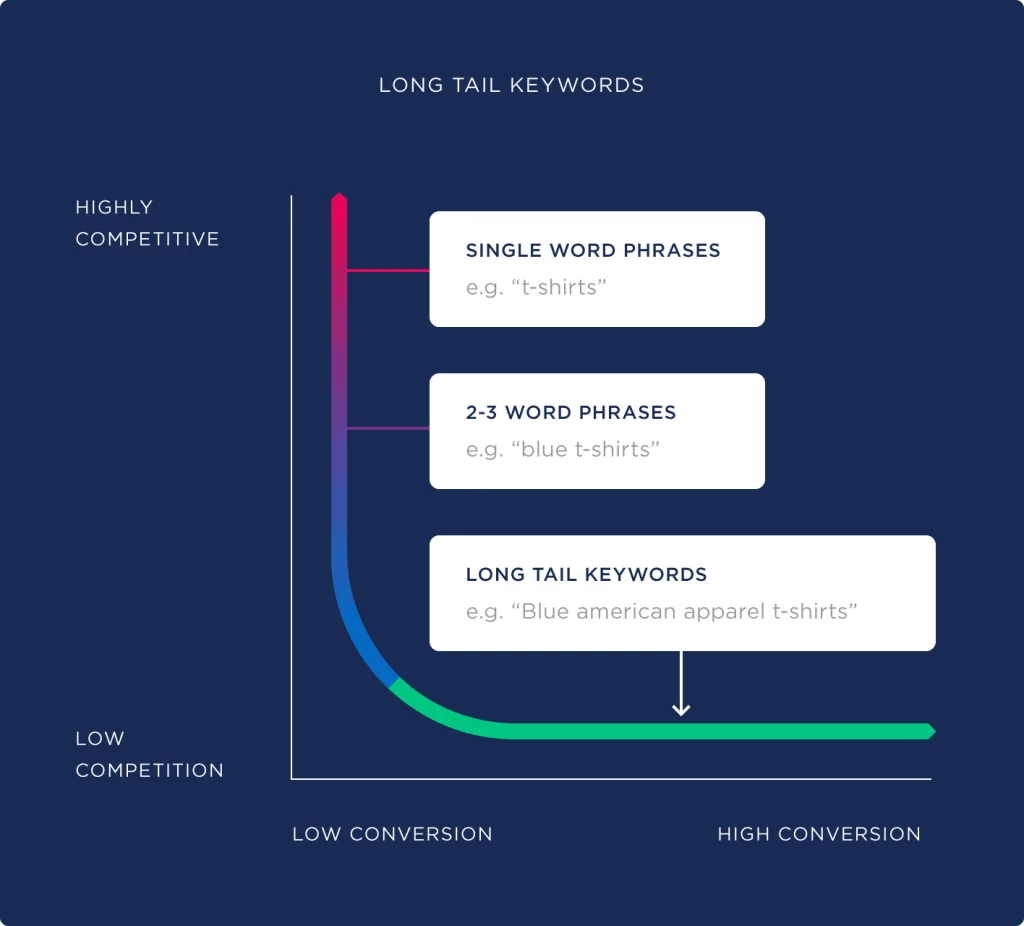
- Although individual long tail queries may have low search volume, when combined, long tail keywords make up a significant portion of all Google searches.
- A report states that 92% of all keywords receive 10 or fewer searches per month. In other words, 92% of all keywords people enter into search engines are long tail.
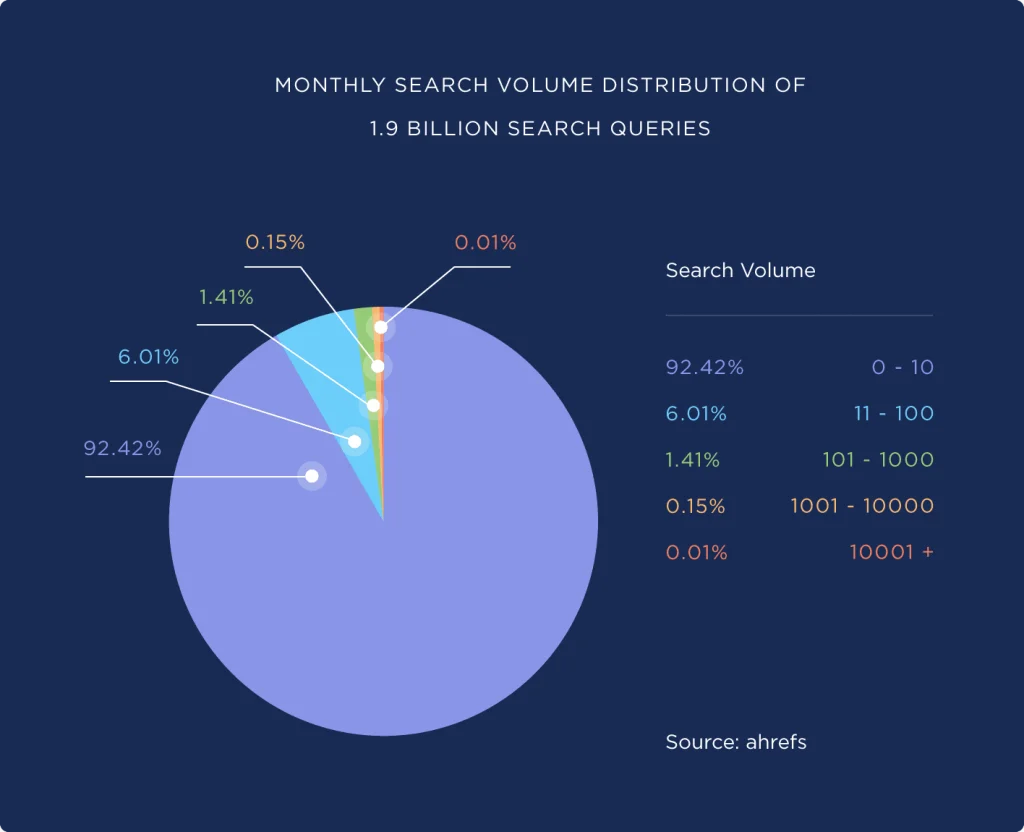
- Long tail keywords are not as competitive. For example, a short tail keyword like ‘link building’ has over 6 billion results on Google. On the other hand, a long tail version of that keyword, such as ‘best SEO link building software,’ has much less competition compared to the main term ‘link building.’
Below is a screenshot of the search results for the short tail keyword ‘Link building’ on Google.
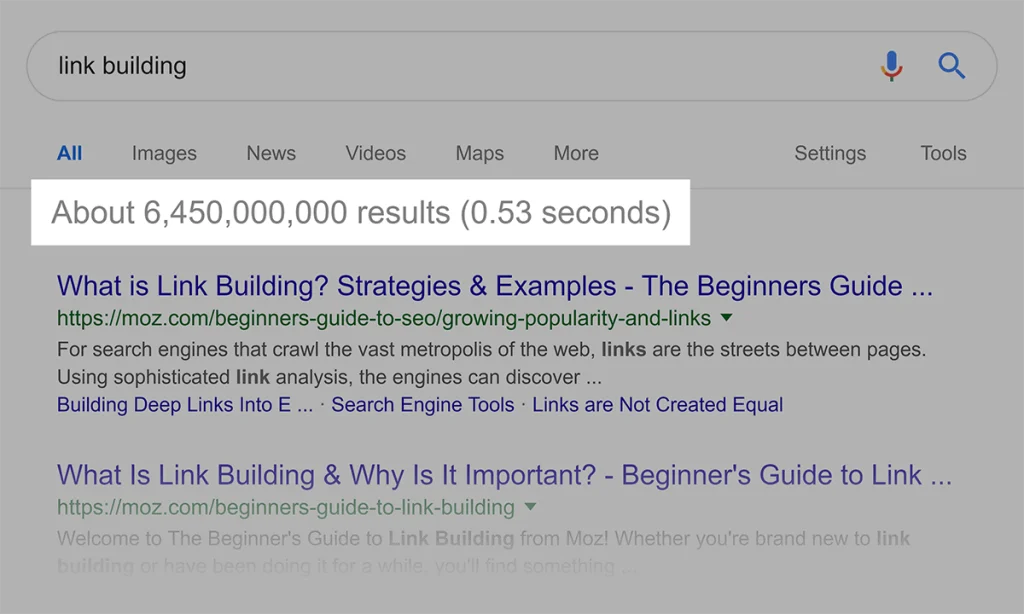
Below is a screenshot of the search results for the long tail keyword ‘Link building’ on Google.
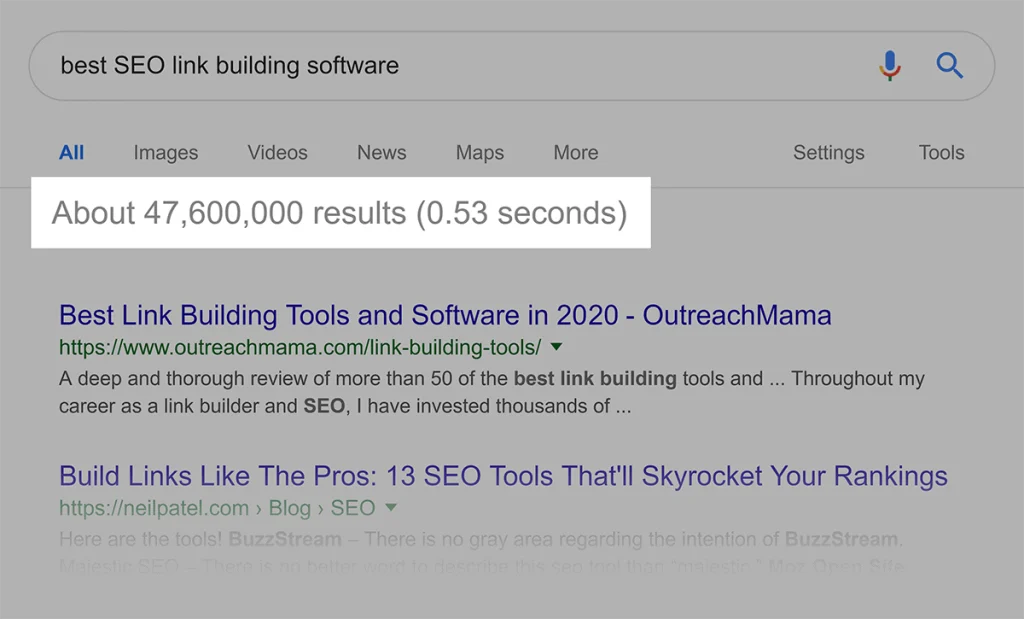
- Long tail searches are not only longer but also more specific. This means that people searching for long tail terms tend to be much further along in the buying cycle compared to those searching for main terms.
Backlinko – Analysis of 306M Keywords
- 91.8% of all search queries are long tail keywords. However, long tail keywords account for a relatively small percentage of the total search volume (3.3%).
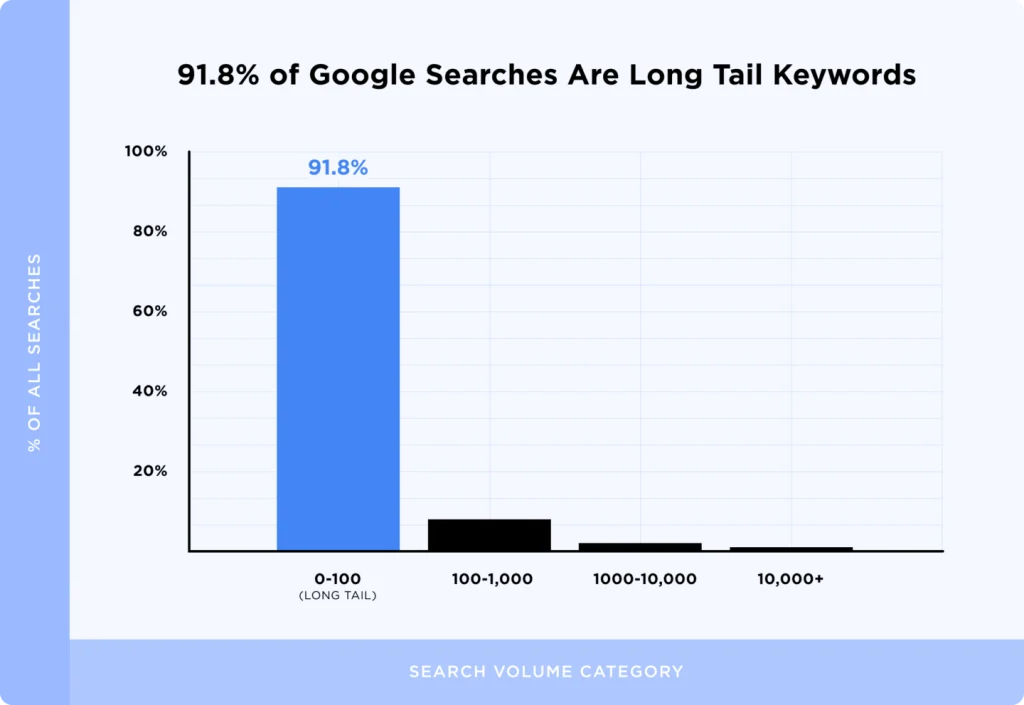
- Search demand is concentrated in a small percentage of high-volume terms. In fact, the top 500 most popular search terms make up 8.4% of all search volume.
- The average keyword receives 989 searches per month. However, the median search volume for a keyword is only 10 searches per month, showing that low-volume long tail keywords are highly prevalent in Google search.
- The average keyword has 1.9 total words. And as expected, longer keywords are searched less frequently than shorter ones. In fact, keywords with 5+ words receive on average 10 times fewer searches than search terms with 1 to 3 words.
Beyond the Beginning – How to Monitor and Update Keywords on Your Blog?
Incorporating SEO keywords into your blog is just the first step of an SEO journey. It’s not enough to insert keywords once and then forget about them. In fact, constant monitoring and updating of SEO keywords are essential to ensure their relevance over time.
But why is it crucial to keep keywords updated? The importance lies in the evolution of search trends and adapting to the ever-changing needs of the audience. A popular long tail keyword today may not be so tomorrow.
Continuous adaptation is the secret to a positive long tail effect in your SEO strategy. This means staying updated on emerging SEO keywords, understanding how your readers’ preferences change, and modifying your content accordingly.
In summary, SEO optimization is an ever-evolving process that requires dedication. If you want to delve further into refining your SEO strategy, we recommend our article ‘SEO Optimization for Blogs.’
If you want to explore this topic further, we’ve written a dedicated and in-depth section on tracking results in an SEO strategy.
Successful Blogs Using Keywords for SEO:
- Salvatore Aranzulla
A striking example of the long tail effect in blogging is represented by Salvatore Aranzulla. This influential blogger has reached extraordinary heights through his dedication and the ability to create high-quality content. But what are the key elements that fueled his success?
First and foremost, Aranzulla is known for generating content that directly addresses users’ questions and needs. This strategy, based on the principle of SEO keywords, has enhanced his online presence, making his blog an indispensable source of information for many. Users value the responsiveness and utility of his articles.
Additionally, Aranzulla possesses a deep understanding of SEO practices, especially on how to choose keywords for SEO, and he skillfully implements them in his posts. This ensures that his content is well-positioned in search engines, increasing the flow of visitors to his blog.
Another pillar of his success is the ability to communicate clearly and directly. His articles, enriched with relevant keywords related to user searches, are written in an understandable manner, making them accessible to a wide audience. This communicative clarity helps capture and retain readers’ attention.
Aranzulla also manages advertisements discreetly, avoiding alienating his readers with intrusive ads. This balance between substantive content and measured advertising is highly appreciated by visitors.
The centerpiece of Aranzulla’s blog is the solution to technological and computer-related queries, an area where SEO keyword searches are crucial. His expertise and promptness in solving readers’ issues have made his blog a treasure for many.
Salvatore Aranzulla’s triumph in the blogging world underscores the importance of producing valuable content, listening to the audience, and adopting effective SEO optimization strategies. His method has inspired numerous aspiring bloggers to emulate him, aiming to achieve similar results in the blogging world.
- Digital Nomads
Imagine being able to work from anywhere in the world at any time you desire. It sounds like a dream, doesn’t it? That of Digital Nomads is a platform that has achieved great success precisely because the possibility of working from any location fascinates more and more people, and therefore, more users. The concept of a ‘digital nomad’ refers to individuals who work remotely from various locations around the world, often during their travels. This trend is becoming increasingly popular among Italians eager to have the freedom to work from anywhere and explore the world. To succeed as digital nomads, effective strategies are necessary.
Essentially, digital nomads stand out for their focus on a specific niche market, the creation of high-quality content, and authentic communication. They use online platforms such as blogs, social media, and podcasts to share their experiences. Furthermore, they diversify income sources through strategies like affiliate marketing and selling digital products.
Technical awareness is crucial for them, as they work online. Building networks and collaborations is common, and time management is essential to maximize productivity. In summary, digital nomads achieve success through a combination of skills, authenticity, and adaptability to remote work.
Conclusions
Keywords, especially long tail keywords, are more than just simple text strings. They are the heart of every successful SEO strategy. But to harness the power of keywords to the fullest, it’s essential to understand that they are dynamic and require constant monitoring. In short, keywords are crucial for the success of your blog, but the real magic lies in adapting and growing with them.